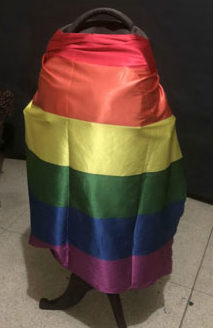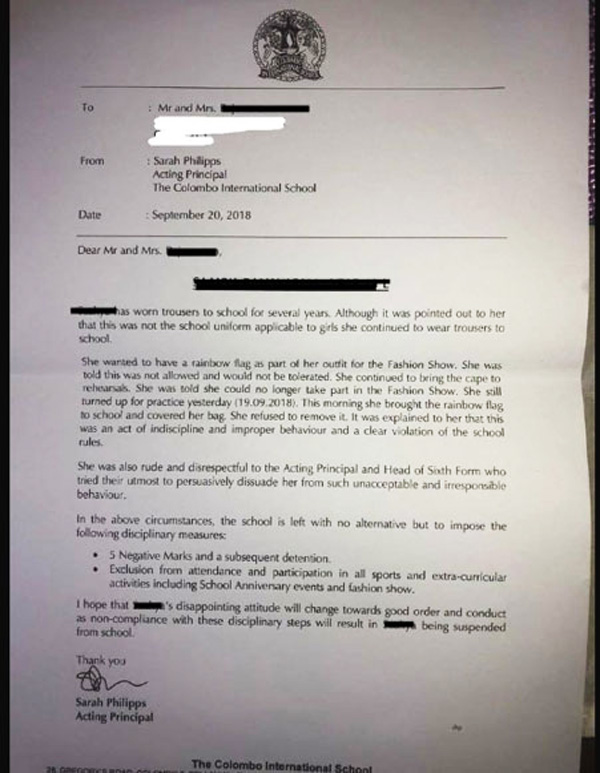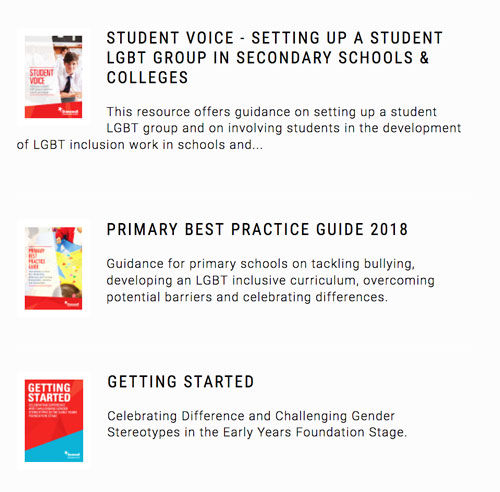Sri Lanka: British vice-principal bullies LGBT+ pupil
Colin Stewart is a 45-year journalism veteran living in Southern…
A teenage Sri Lankan student who self-identifies as bisexual and gender-fluid was disciplined and then refused entry to school last month after displaying a rainbow flag and wearing trousers.
![Colombo International School [http://www.cis.lk]](https://76crimes.com/wp-content/uploads/2018/10/Colombo-International-School.jpg)
Saakya Rajawasan is a university-preparatory Grade 13 pupil at Colombo International School, one of Colombo’s premier English-language schools, founded by renowned British educator Elizabeth Moir.
Last month, Saakya’s request to include a rainbow flag in a school fashion show outfit was refused, and she was subsequently banned from being part of the fashion show. Saakya then wrapped her school bag in her rainbow cape. This earned the wrath of Sixth Form teacher Vinod Senadheera.

When the issue went to Acting Principal Sarah Philipps, a British national, things got worse. Philipps signed a letter addressed to Saakya’s parents, imposing a harsh punishment, which included “five negative marks and a subsequent detention, plus exclusion from attendance and participation in all extra-curricular activities including School Anniversary events and fashion show.”
When Saakya tried to deliver food that she had promised for the anniversary event, without planning to attend it, she was denied entry into school premises. Security escorted her out, an experience she described as “dehumanizing.”
The letter from the school to Saakya’s parents (See below) also threatened Saakya with suspension.
The same letter accused Saakya of wearing trousers for school after “it was pointed out to her that this was not the school uniform applicable to girls”. Due to this gender binary-focused uniform policy, Saakya – who obtained A+ grades for her AS Level examinations – was also denied the opportunity to become a school prefect.

This daylight homophobia against a pupil who does not conform to cis-hetero-normative dictates caused outrage among LGBT+ rights activists. The Colombo Telegraph, a Sri Lankan media outlet with a strong national and international outreach, ran two lead stories on the sorry treatment of Saakya. Social media, such as the Facebook page Sri Lanka is Next — a campaign launched by LGBT+ scholars and professionals in the aftermath of the Indian Supreme Court’s recent decision to repeal Section 377 of the Indian Penal Code — were awash with posts that expressed support to Saakya. The majority of these posts are tagged under the hashtag #IstandwithSaakya on Facebook and Twitter.
Social media posts on the issue reflected how many Sri Lankans were appalled by the homophobic bullying in a leading secondary school.
This incident leads us to raise several key questions, which are briefly considered below.
Continuing coloniality: Why are Victorian values not dead?
In the Sri Lankan and global media coverage that this story has received so far, one core aspect that is often sidelined is the colonial connotation of the entire episode. In an elite school, the vice principal, a white woman who is a British national, condones homophobic bullying of a brown-skinned Sri Lankan child. The racial dynamics here are extremely important. It was under British colonial rule that homophobic legislation and a range of misogynist laws were forcibly imposed on Sri Lankans.

A British national working in a school in Sri Lanka ought to be conscious of this heavy historical baggage. Besides, the acting principal’s attitude is one that shows complete disregard to latter-day developments in the inclusion of non-cis-hetero-normative children and young people in schools. Organisations in the UK such as Stonewall have done substantive amounts of work on the matter, and produced helpful reference material.
Many socially conservative positions about education are also direct inheritances of Christian missionary education. The chairman of Colombo International School, as several parents noted to this writer, has been engaged in a desperate effort to impose a Victorian brand of strict conservatisms upon the school. Strict adherence to a uniform policy based on the gender binary, and an inclination to totally obliterate non-cis-heteronormative students [as in the case of Saakya Rajawasan] are part and parcel of this attitude. To follow this logic, the intention of including a rainbow flag in a fashion show outfit, draping a school bag in a rainbow flag, or wearing trousers to school are sufficient reasons to impose harsh punishments of on a student, such as detention, reduction of grades and a ban on extra-curricular activities.
The entire system of education in Sri Lanka continues to function under extremely conservative codes, where the slightest deviation from a highly cis-hetero “norm” is not welcome. Releasing a public statement, Saakya Rajawasan noted that she left a local school to attend a high-fee-paying private institutions such as Colombo International School in search of a schooling context that would be more open-minded. However, her experience demonstrates that the spirit of openness in such elite institutions is highly limited.
Schools need anti-bullying policies
In Sri Lanka, the system of primary and secondary education is yet to benefit from a consistent national policy on preventing bullying in schools. Non-cisnormative children are at the receiving end of bullying in school by their peers as well as by teachers. The case of Saakya is evidence that not even the most elite institutions are immune to institutional bullying on homophobic and transphobic grounds. In a leading school that purports to cater to world-class universities in a highly “international” ambiance, the fact that there is no space for a 17-year-old to include a rainbow flag in a school fashion show outfit signals a level of intolerance that does not fit a modern, internationally oriented educational institution.
This incident highlights the vital importance of strong anti-bullying policies in primary and secondary education. In a country seeking to heal from the scars of a 30-year ethnonational war, where deep socio-political, economic, linguistic and cultural differences are rife, this is all the more important. It is in such an all-inclusive anti-bullying policy must include issues related to SOGIESC (Sexual Orientation, Gender Identity and Expression, and Sex Characteristics).
SOGIESC rights in Sri Lanka: a promising path?
On another note, this incident occurred in the capital city of a country in South Asia where homophobic British laws are still in place. The most heartening outcome was the outpouring of public support for Saakya Rajawasan, with one leading media outlet claiming “Future generations of Sri Lankans will look up to the name Saakya Rajawasan for her pioneering resistance to social conservatisms, for her courageous stance to be herself in a school where the management happened to be stuck somewhere in Victorian times. Colonial hangovers are such that many Sri Lankans still view childcare, primary, secondary and tertiary education, gender justice, SOGIESC rights in a socially conservative lens”.
This high level of support for a non-cis-hetero-normative young person, if anything, is proof that Sri Lanka is slowly but steadily in transformation, to a country where any form of SOGIESC-phobia will be met with high levels of resistance and backlash.
The future, then, is set to be that of equality and justice.
Related reading:
- “Shame on you, Colombo International School” (Colombo Telegraph, 4 October 2018)
- “Colombo International School violates fundamental rights of a pupil” (Colombo Telegraph, 3 October 2018)
- “Colombo International School homophobic bullying saga: victimised student goes public–activists commend” (Colombo Telegraph, 8 October 2018)
- “An elite school banned girl for displaying pride flag, but she fought back” (Gay Star News, 9 October 2018)
About the author:
Chamindra Weerawardhana is an writer, journalist, political analyst and international consultant. She is the author of Decolonising Peacebuilding: Managing Conflict from Northern Ireland to Sri Lanka and Beyond. She has also published in international peer-reviewed journals such as Meridians, Labour History and Socialism and Democracy. A prolific public speaker, Dr Weerawardhana speaks internationally on a range of topics including international relations, gender justice, women in politics and rainbow parenting. Her journalistic writing has appeared in Sri Lankan and international media outlets.
Also by Dr. Weerawardhana:
- Needed: International support for culturally savvy LGBTQI leaders (March 2017, 76crimes.com)




